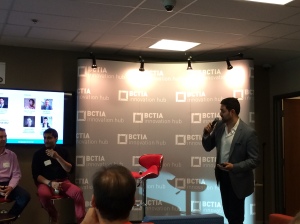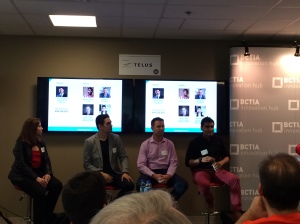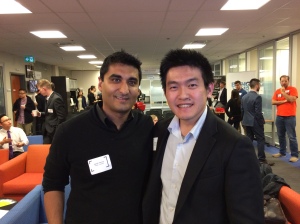GradusOne x Technology Tech panel
Date: April 9, 2015
Name: GradusOne x Technology Tech panel

 Presenters: Sarah Lubik, Adrian Duke, Jayesh Parmer, and Jeff Booth
Presenters: Sarah Lubik, Adrian Duke, Jayesh Parmer, and Jeff Booth
Technology is a huge trend in Vancouver and all leaders need to understand where the potential opportunities are in the market. Moreover, the evolution of technology is increasing the competitiveness in technology market. This panel presentation is hosted by GradusOne and BCTIA. Moreover, Manny Padda, the Managing Director of New Avenue Capital, will moderate this presentation. This presentation invites Sarah Lubik, the Director of Technology Entrepreneurship at Simon Fraser University, Adrian Duke, the Co-founder of Skyturtle Technologies Ltd, Jeff Booth, the CEO of BuildDirect, and Jayesh Parmar, the CEO of Picatic. Furthermore, this presentation will benefit young entrepreneurs who are looking for inspiration from technology sector.
In order to keep up the technology trend, Jayesh Parmar looks at the new product line. Jeff Booth looks at the greater landscape. Adrian Duke focuses on things that will impact daily lives. Moreover, Sarah Lubik looks at the needs from the people who will merge their lives with technology.
The panel describes their defining moments that lead their career in the technology sector. Duke believes many classical games are outdated with their current technology. Due to technology trend, it is an advantage for young entrepreneurs to improve the classic. Lubik shares while she was integrating the current systems through co-op at university, Lubik was inspired from the research that takes scientific fiction to reality. The defining moment for Booth is when he was motivated to create a system in his company that will increase clients’ satisfaction. Parmar suggests young entrepreneurs to get outside and figure out their passion and their challenges.
“If I know what I know, I will not start it”
The panel shares what they feel the most important qualities that young entrepreneurs need to be successful in technology startup. Parmar believes young entrepreneurs need the passion of vision, intellect, and without the fear of failure. Booth recognizes young entrepreneurs with curiosity mind, self-awareness, and care for teammates. Duke believes the personality of doers and hustlers, also young entrepreneurs must have the ability to execute. Lubik focuses on passion, commitments, coachable and humble.
The panel shares their hardest parts to break into the technology sector. Lubik shares while she was in the technology sector, she needs to study the technical production to break through the communication barrier. There are many people who know the technology, but they do not speak in engineer language.
Adrian shares the determination is the hardest part to break into technology sector. Many industries are changing due to technology, and the intersection between the traditional sectors and new innovative sectors are getting bigger. Therefore, Booth believes the hardest part is to figure out the passion to improve the intersection.
There are a lot of great ideas, but to find the team to execute the great ideas is difficult. Parmer believes the hardest part is to find a team that can follow the vision. It is important to get the right people and the right market in the business.
“You are doing it for the right reason”
There is a debate of whether business degree is a requirement to be successful in technology sector. Parmer emphasizes many corporation leaders in technology sector do not have degree. They believe in lifelong learning and the ability to figure out the answers. Booth does not believe business degree is important. It is more important to learn on their ways.
“Outside view will never match with inside view”
“If you are not failing, you are not trying hard enough”
Lubik believes education is important. Young entrepreneurs must understand that the degree by itself is not important, but the skills young entrepreneurs gain in the process of getting the degree is significant.
Duke also believes degree is not important. The important thing is to be around with successful people. Education is just a factor in the entrepreneur journey. Degree shows the ability to learn and young entrepreneurs can use education to prepare themselves in the market.
Parmar suggests young entrepreneurs do not afraid to fail. Booth suggests young entrepreneurs not to hesitate on their journey. It is important to jump in and learn to see what others do not see. Young entrepreneurs must believe that they are right and others are wrong. Duke indicates there are many accelerated programs that will help young entrepreneurs to be surrounded by experts who are motivated and driven. Lubik suggests young entrepreneurs to network with people who might be their potential customers.
“Do not assume people will buy it until you build it”
Mentorship impacts the panel in their journey. Duke learned to care for others, the importance of building effective relationship, and to take risk. Booth shares his mentors are his parents. He learned the gift of learning and relationship. Young entrepreneurs can build the level of trust from helping others. Parmer mentions mentorship can help young entrepreneurs to shrink time to get to the answer faster. If mentors do not know the answer, they will refer to someone else. It is important to ask clear question.
The panel shares their examples of their minimal viable products. All their initial designs are not attractive. However, with new modification and upgrades, all prototypes are in the market helping other people’s lives.
Parmer believes volunteering is a great way to find the initial problem. Young entrepreneurs can use the volunteering time to discover what they need to do. While volunteering, Booth recommends young entrepreneurs to act like CEO. Volunteering can satisfy young entrepreneurs’ learning curves. Duke recommends young entrepreneurs to enjoy the moment of volunteering. Lubik wants young entrepreneurs not to work for free; instead, they should think the skill sets they can acquire during volunteering. They need to figure out the initiative, and people will pay.
 In technology sector, Lubik believes there is a need of improvement in the Healthcare center. Duke believes the sharing economy will be a trend opportunities in technology sector. Booth indicates the old “command and control” method is gone and empowering is the new trend for the new generation. Parmer asks young entrepreneurs to find the passion that will keep them up at night.
In technology sector, Lubik believes there is a need of improvement in the Healthcare center. Duke believes the sharing economy will be a trend opportunities in technology sector. Booth indicates the old “command and control” method is gone and empowering is the new trend for the new generation. Parmer asks young entrepreneurs to find the passion that will keep them up at night.
The panel has been asked what they will do if they are not in the technology sector. Parmer wants to be a family member who can create memory for his family. Booth wants to treat every moment with his family to build a stronger relationship. Duke wants to travel and help people. Lubik wants young entrepreneurs to know that jobs opportunities in technology sector will always exist; therefore, they should choose things they believe in it.
